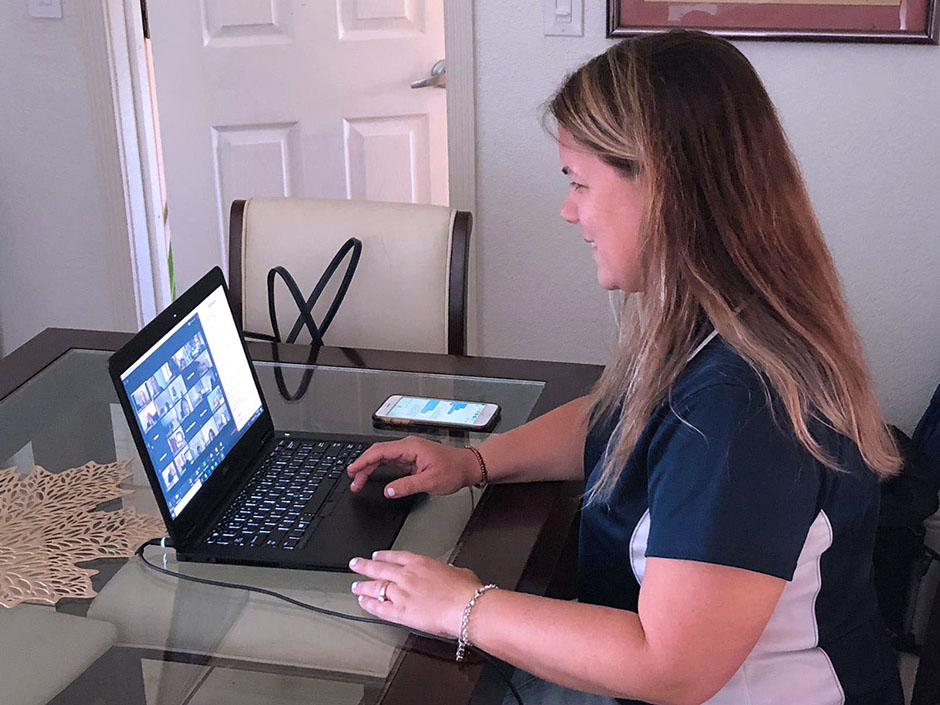Connecting remotely and virtually is the new norm during these days of the coronavirus pandemic, and the changes deeply affect families with special-needs children who receive in-person services. To help families cope and stay connected, University of Miami programs like the Linda Ray Intervention Center and the University of Miami-Nova Southeastern Center for Autism & Related Disabilities (UM-NSU CARD) are reevaluating their resources to deliver the best services they can to help families in need during these turbulent times.
At the Linda Ray Intervention Center, which provides early intervention and collaborative programming for children living in at-risk environments and communities impacted by substance abuse and addiction, teachers, counselors, and service coordinators continue to reach out to families, usually by phone. But Lynne Katz, director of the center, which opened in 1993 adjacent to the University’s medical campus, said the outreach requires creativity and is particularly challenging for those families who lack computers and internet services.
“While most families have a cell phone, they may be limited when it comes to educational learning materials at home for their very young children,” said Katz, a research associate professor. “They may not have a computer at home, and many don't have email or internet access. Our families range from those who are tech savvy using their smartphones to grandmothers who are raising grandchildren and only use their phones to make or receive calls. Our goal is to still stay connected to everyone somehow.”
For family caregivers who do have internet, center staff are connecting them to webinars they can watch or listen to from state resource networks and online programming such as PBS Kids and online platforms such as Conscious Discipline for parents with children who have challenging behavior. Daily outreach using Zoom platforms, Katz said, allow staff to provide virtual storytelling, behavioral coaching and to somehow simulate a teaching experience from their classrooms.
“Parents continue to express appreciation and some take photos or videos of their children doing their school activities,” she added.
In Miami-Dade, Broward, and Monroe counties, UM-NSU CARD serves more than 13,000 families who utilize the organization’s free autism-related support, clinical care, and educational programs. In mid-March, when public schools began to close and recommendations for social distancing measures were being implemented across the country, CARD teams in five branch locations across South Florida began to assess service-delivery options and ways to remain fully operational while remote.
“Our families are so appreciative of our efforts to stay connected with them during this very difficult time,” said Michael Alessandri, CARD’s executive director and a clinical professor of psychology. “The loss of school and therapy hours has them rightfully worried about regression in their children.”
Numerous online resources are now available to help parents and caregivers with children on the autism spectrum cope and stay connected during this time of isolation and uncertainty. The resources include virtual chat sessions with CARD board members, fitness and nutrition advice from physical education teachers, and mental health online support groups. CARD employees are also conducting Zoom meetings for intake appointments with new families and online training with other staff members.
While imperfect, the resources and outreach are welcomed and soothing, according to Silvia Gil, manager of the Daniel Jordon Fiddle Foundation Transition and Adult Programs at the UM-NSU CARD Miramar branch office.
“Families and adults on the spectrum have found comfort in speaking with clinicians to learn strategies and simply just to connect and talk about their situations,” Gil said.
For more information, visit www.fdlrs-um.miami.edu and UM-NSU CARD. For information about CARD’s online resources, visit https://linktr.ee/umnsucard.
Maintaining vital connectivity

